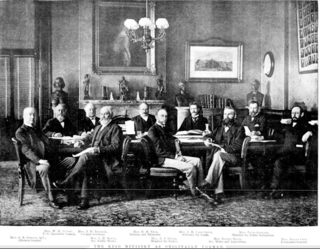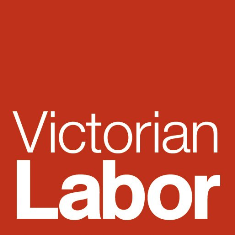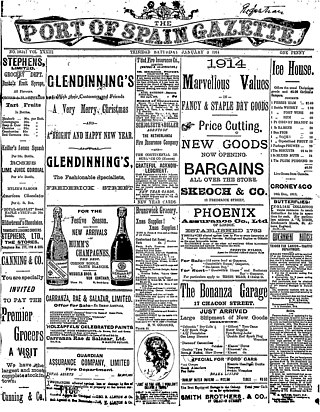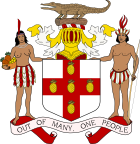
George Leake was the third Premier of Western Australia, serving from May to November 1901 and then again from December 1901 to his death.

Sir William Alexander Clarke Bustamante was a Jamaican politician and labour leader, who, in 1962, became the first prime minister of Jamaica.
Paul Edwards is a Manitoba politician and lawyer. He served as leader of the Manitoba Liberal Party from 1993 to 1996.

Lisa Rene Shanti Hanna is a Jamaican politician and beauty queen who was crowned Miss World 1993, becoming the third Jamaican to win the title. A member of the opposition People's National Party, Hanna currently serves as Member of Parliament for Saint Ann South East, and was Jamaica's Minister of Youth and Culture from 2012–2016. Hanna was a candidate in the 2020 People's National Party leadership election, following the PNP's defeat at the 2020 Jamaican general election and the subsequent resignation of PNP President and Opposition Leader, Peter Phillips. Hanna was defeated by Mark Golding, receiving 1,444 votes to Golding's 1, 740 votes, a difference of 296 votes.

Sir Charles Sladen,, Australian colonial politician, was the 6th Premier of Victoria.

The First Parliament of the Province of Canada was summoned in 1841, following the union of Upper Canada and Lower Canada as the Province of Canada on February 10, 1841. The Parliament continued until dissolution in late 1844.

Sir Joseph Palmer Abbott, was an Australian politician, pastoralist and solicitor.
The history of the Jews in Jamaica predominantly dates back to migrants from Spain and Portugal. Starting in 1509, many Jews began fleeing from Spain because of the persecution of the Holy Inquisition. When the English captured Jamaica from Spain in 1655, the Jews who were living as conversos began to practice Judaism openly. By 1611, the Island of Jamaica had reached an estimated population of 1,500 people. An estimated 75 of those people were described as "foreigners," which may have included some Portuguese Jews. Many Jamaican Jews were involved in the Atlantic slave trade, both owning and trading in enslaved Black people.
Members of the New South Wales Legislative Assembly who served in the 11th parliament of New South Wales held their seats from 1882 to 1885. Elections for the eleventh Legislative Assembly were held between 30 November and 21 December 1882 with parliament first meeting on 3 January 1883. The Assembly was expanded to 113 members elected in 40 single member electorates, 26 two member electorates, 3 three member electorate and 3 four member electorates. The parliament had a maximum term of 3 years and was dissolved on 7 October 1885 after 33 months. The Premiers during this parliament were Sir Alexander Stuart until 7 October 1885 and then George Dibbs. The Speaker was Edmund Barton.

Kenneth Wykeham McNeill, MD, MP, CD is a Jamaican politician and former member of parliament for Westmoreland West, Jamaica. He is a former government minister. He was the Minister of Tourism of Jamaica from 2012 to 2016. He was elected the first vice chair of the Executive Council of the United Nations World Tourism Organization representing Jamaica in 2012 and elected chairman of the Executive council for the 2014-2015 period. McNeill was elected a Vice President of The People's National Party at the Party's annual conference in September 2016.

The Reid ministry was the 28th ministry of the Colony of New South Wales, and was led by the 12th Premier, George Reid. The title of Premier was widely used to refer to the Leader of Government, but was not a formal position in the government until 1920. Instead the Premier was appointed to another portfolio, usually Colonial Secretary but on this occasion Reid took the portfolio of Colonial Treasurer until July 1899 and then Attorney General.

William Knox Simms was a brewer, businessman and politician in the early days of South Australia.

Federal elections were held in the West Indies Federation for the first and only time on 25 March 1958. The result was a victory for the West Indies Federal Labour Party, which won 25 of the 45 seats in the House of Representatives.

The Victorian Labor Party, officially known as the Australian Labor Party and commonly referred to simply as Victorian Labor, is the Victorian state branch of the Australian Labor Party (ALP). The party forms the incumbent government in the state of Victoria and is led by Jacinta Allan, who has served concurrently as Premier of Victoria since 2023.

Mary Morris Knibb, MBE was a Jamaican teacher, social reformer and philanthropist. She founded the Morris Knibb Preparatory School and donated a building which is used as the headquarters of the Moravian Church in Jamaica as well as land for construction of a community center. Morris Knibb was a women's rights activist and the first elected councilwomen in Jamaica. She was the first woman to vie for a seat in the House when Universal Suffrage was granted to all Jamaicans.

Maymie de Mena was an American-born activist who became one of the highest-ranking officers in the Universal Negro Improvement Association (UNIA). She has been credited with keeping the organization alive after Marcus Garvey's conviction for mail fraud and deportation from the United States.

Ivy Inez Joshua was a Grenadian-born seamstress and politician, who was the first woman elected to serve in the Legislative Council of Saint Vincent and the Grenadines when universal suffrage was granted. Though she won her seat in six consecutive election cycles, with a substantial majority each time she ran, Joshua was often the target of politically-based inquiries and investigations. She served in the legislature from 1958 to 1979 and simultaneously on the Executive Council from 1960 when she was appointed as the Minister of Social Services. Joshua served from 1961 to 1964 and again from 1967 to 1972 as a Minister without portfolio, before being appointed as Parliamentary Secretary and later leader of the opposition.
Ivan Stewart Lloyd was a Jamaican medical practitioner and politician, representing the People's National Party (PNP). He served as Jamaica's first Leader of the Opposition from 1944 to 1949, minister of education and social welfare from 1955 to 1957, minister of home affairs from 1957 to 1959, and was minister of health between 1959 and 1962.
Ramsaran Lionel "Sarran" Teelucksingh was a Trinidad and Tobago businessman and politician. The first Indo-Trinidadian elected to the Legislative Council, Teelucksingh represented the county of Caroni from 1925 until 1946 and was active in the leadership of the Trinidad Workingmen's Association (TWA), Trinidad Labour Party (TLP), and the East Indian National Congress (EINC).

The Port of Spain Gazette was a newspaper based in Port of Spain, Trinidad between 1825 and 1959. The paper took a proslavery position in the 1830s, and later supported the rights of local elites against the Crown colony government. In the twentieth century the paper supported the government and opposed the labour movement.















